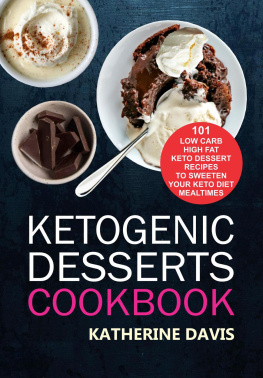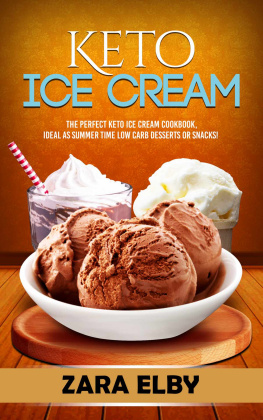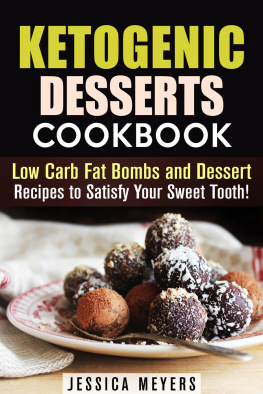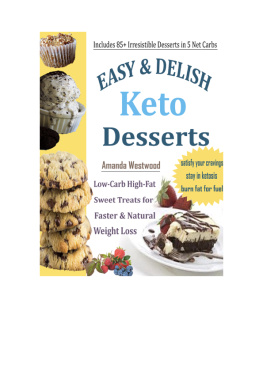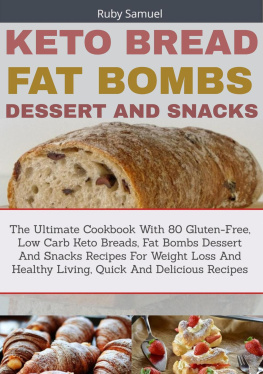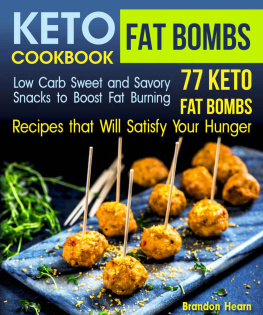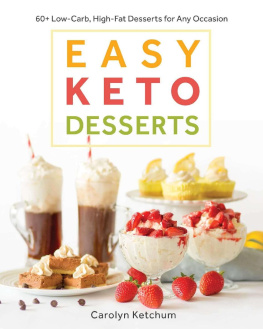The Essential Keto Desserts Cookbook
Bring the Happiness and Sweetness into Your Life with 550 Newest, Creative and Low-Carb Recipes
By Melvin zeto
Copyright 2o20 by Melvin zeto -All rights reserved.
No part of this publication may be reproduced, distributed, or transmitted in any form or by any means, including photocopying, recording, or other electronic or mechanical methods, without the prior written permission of the publisher, except in the case of brief quotations embodied in reviews and certain other non-commercial uses permitted by copyright law.
This Book is provided with the sole purpose of providing relevant information on a specific topic for which every reasonable effort has been made to ensure that it is both accurate and reasonable. Nevertheless, by purchasing this Book you consent to the fact that the author, as well as the publisher, are in no way experts on the topics contained herein, regardless of any claims as such that may be made within. It is recommended that you always consult a professional prior to undertaking any of the advice or techniques discussed within.This is a legally binding declaration that is considered both valid and fair by both the Committee of Publishers Association and the American Bar Association and should be considered as legally binding within the United States.
CONTENTS
Introduction
What is keto
Keto is short for ketogenic diet a way of eating that is high in fat, moderately high in protein, and low in carbohydrates. The premise of the keto diet is to stop your body from burning glucose (sugar) for energy and force it to burn fat for energy instead. Carbs are restricted to 10% of daily food intake; protein is just 20%. The rest is fat. Eating high fat and very low-carb forces the body into ketosis a metabolic state where your body burns fat for energy instead of glucose.
Ketosis is considered a prime weight loss state.
Medically, the ketogenic diet was developed to treat serious conditions. Certain cancers, PCOS, autism, and degenerative brain diseases like Alzheimers and Parkinsons respond well to the keto diet. The keto diet has also been used to treat epilepsy for over 100 years.
Therefore, the keto diet is absolutely a healing diet.
However, keto is also the latest diet trend. More than being used therapeutically, its also being used to hack the body to achieve faster weight loss and exercise and body-sculpting gains.
What are keto desserts?
If were going off the guidelines of the keto diet, a keto dessert is one that is high in fat, moderate in protein, and low in carbs.
Common ingredients for keto desserts include:
Almond flour and coconut flour
Coconut cream/full-fat coconut milk
Heavy whipping cream
Full fat cream cheese, preferably cultured
Nuts or seeds, preferably soaked or sprouted
Berries, cranberries, lemon, and lime
Cacao powder, cocoa butter, and stevia-sweetened chocolate chips
Unsweetened, shredded coconut
Almond, peanut, and pecan butters
Eggs
Fats like butter, ghee, coconut oil, and avocado oil
Keto desserts are further set apart in that they do not contain grains or grain-based flours or any form of sugar, whether white sugar or a whole sweetener like honey or maple syrup. Many desserts are made with artificial sweeteners, such as Splenda or NutriSweet, but do not buy the claim. By nature, a keto diet is healing and these sweeteners are the antithesis of healing. So, what makes keto desserts sweet? Typically a combination of several keto-friendly sweeteners is used to make keto desserts sweet. The most common keto sweeteners are: erythritol, xylitol (should not be in homes with dogs!), stevia powdered and liquid, monkfruit, or any combination of the above such as brands like Lakanto and Swerve
Some reasons why eating keto desserts
For gut health.
Sugar feeds pathogenic organisms in the gut, allowing them to multiply. An overgrowth of pathogenic organisms leads to issues like candida, SIBO, H. Pylori, and overall digestive discomfort like bloating, gas, and constipation.
If you already have an overgrowth of pathogenic bacteria or yeast in your microbiome, youre feeding the bad guys every time you consume sugar. Yes, even unrefined, whole sweeteners like raw honey, coconut sugar, or maple syrup. Those pathogenic organisms dont discriminate. Whether its high fructose corn syrup from your Coke or raw honey from the bees in your backyard, sugar feeds harmful bacteria and yeasts. You eat keto desserts because you want to keep those pathogenic organisms under control and have a healthy microbiome!
For blood sugar.
Its no secret that diabetes runs in families.
Hypoglycemia is basically a deficiency of glucose in the blood (low blood sugar). The symptoms are annoying and often scary and include headaches, extreme hunger, dizziness, vision problems, weakness, irritability, nausea, and shaking. Processed carbs and sugar in desserts contributes to the sharp rises and falls in insulin the hormone that regulates our blood sugar. You eat keto desserts because you want to enjoy sweets without contributing to imbalanced blood sugar.
To reduce inflammation.
Sugar contributes to inflammation.
A rise in blood sugar causes your body to crank out pro-inflammatory molecules called cytokines. The more sugar you eat, the more insulin your pancreas has to crank out to keep your blood sugar stable. Over time, your cells become resistant to all that insulin. And, insulin resistance is the precursor to diabetes. Insulin resistance also causes excess sugar to be stored as visceral fat (ie. belly fat) which is itself cranking out inflammatory molecules. Furthermore, sugar counteracts the anti-inflammatory processes in the body and anti-inflammatory foods. So, you could eat all the turmeric, kale, and coconut oil in the world, but if you are still indulging in a sugary dessert, youre counteracting the positive effects of those superfoods. Here is a study showing that sucrose (white sugar) counteracts anti-inflammatory fish oil. You eat keto desserts because you dont want to add to your bodys inflammatory load.
For hormones
Women need good carbs for the production of our hormones. Our adrenals need carbs. Our ovaries need carbs. And, our brains need carbs.
Hormone-supporting carbs are complex carbs:
root veggies like carrots, beets, celeriac, and potatoes
winter squashes like butternut squash, delicata squash, and pumpkin
brown rice and wild rice
soaked or sprouted beans
soaked, sprouted, or soured gluten-free grains like oats, quinoa, buckwheat, and sorghum
sweet potatoes
Carb sources that do not support our hormones:
sugar in all forms
whole sweeteners: coconut sugar, maple syrup, sucanat, evaporated cane juice, and honey
processed foods like toaster waffles, breakfast cereals, instant anything, frozen pizza, commercial ice cream, deep-fried carbs. When were eating Real Food keto or not were supporting healthy hormone production for our cycles, thyroids, sleep, and stress management. When were not eating Real Food, were not supporting healthy hormone production. We eat keto desserts because any other dessert is made with some form of sugar, which doesnt support our hormones.
Why Desserts Are Important to Keto and a Sustainable Diet
The concept of keto desserts sounds like its an oxymoron, ranking up there with giant shrimp and deafening silence. After all, doesnt the whole concept of keto revolve around eliminating all sweets? This is where understanding the basics of how keto works is crucial to know what desserts you can and cant eat, and more importantly, why. This article discusses why desserts are important psychologically, what the dietary aspects of the sweet, final dinner course are, and how you can manage or avoid common social pressures. One of the biggest downfalls we see in keto dieting is approaching this eating style from the wrong perspective. So many people are looking for a quick fix in a few weeks. Perhaps they need to drop ten pounds before a wedding, reunion, or bathing suit weather, and they want to take a bit of weight off for a few months. They dont really care how it happens as long as the job gets done.


